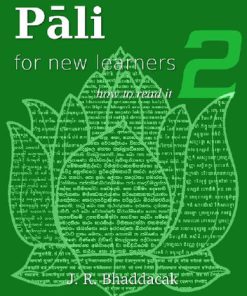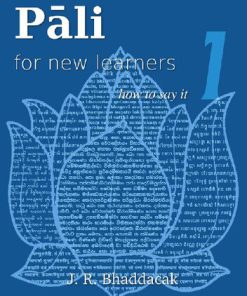Pali for New Learners Book I How to say it 1st Edition by JR Bhaddacak
$50.00 Original price was: $50.00.$25.00Current price is: $25.00.
Pali for New Learners Book I How to say it 1st Edition by JR Bhaddacak – Ebook PDF Instant Download/Delivery:
Full download Pali for New Learners Book I How to say it 1st Edition after payment

Product details:
Author: JR Bhaddacak
Learning Pāli pronunciation provides an essential foundation for students who wish to engage deeply with the canonical texts of Theravāda Buddhism. In Pāli for New Learners: Book I – How to Say It, J. R. Bhaddacak presents a reader‑friendly guide to the phonetics and sound system of the language, explaining how each Pāli letter is articulated, how sounds combine (sandhi), and how accent and length affect meaning. By mastering pronunciation early, learners can develop more accurate and confident reading skills, enabling clearer access to the rhythm, phrasing, and nuance of Buddhist discourse in its original form.
Pali for New Learners Book I How to say it 1st Edition Table of contents:
Part I – Foundations
-
Critical Introduction to Pali
-
Did the Buddha Speak Pali?
-
How Reliable is the Pali Canon?
-
Why Study Pali Then?
Part II – Grammar Basics (Nouns and Pronouns)
-
Nuts and Bolts
-
Introduction to Pali Letters
-
(There is) a Book
-
Declension of Nominative Case
-
(There is) a Big Book
-
Introduction to Adjective
-
This (is) a Book
-
Demonstrative Pronouns
-
It (is) a Book
-
Personal Pronouns
Part III – The Verb “To Be” and Possession
-
There is a Book
-
Verb to Be
-
I Have a Book
-
Declension of Genitive Case
-
My Daughter is Wise
-
Irregular Nouns
Part IV – Verbs and Verb Tenses
-
I Go to School
-
Conjugation of Present Tense
-
I Went to School – Past Tense
-
I Will Go to School – Future Tense
-
Go to School, Boys – Imperative Mood
-
You Should Go to School – Optative Mood
-
If You Go to School, You Will Be Wise – Conditional Mood
Part V – Case Declensions (Vibhatti)
-
Declension of Accusative Case
-
I Go to School from Home – Ablative Case
-
I Go to School by Bus – Instrumental Case
-
I Go to School for Knowledge – Dative Case
-
I Go to School in Town – Locative Case
-
Boy, Who Are You? – Vocative Case
Part VI – Sentence Structure and Syntax
-
Interrogative Pronoun
-
I Go Where You Go – Correlative Sentences
-
I and You Do Not Go to School – Indeclinables
-
You Are the Best – Adjective Comparison
Part VII – Additional Grammatical Constructs
-
All I Have Are Four Books – Miscellaneous Pronouns
-
There Are 7.8 Billion People – Introduction to Numerals
-
Cardinal Numbers
-
Ordinal Numbers
-
We Always Walk from Home to School Here – Suffixed Indeclinables
-
Are You Going Home? – More About Questioning
-
I Read a Book Slowly – Adverbs and Repetition
-
Even Though This Book is Difficult – Concessive Clauses
Part VIII – Participles, Absolutives, and Voice
-
Going to Town, I Buy You a Book – Present Participle
-
Having Gone to Town, I Bought You a Book – Past Participle
-
Introduction to Absolutive
-
A Book is Read by Me – Passive Voice
-
Using Kita in Passive Voice
-
I Have You Give Me a Book – Causatives
-
Using Kita in Causatives
Part IX – Other Verb Forms and Speech
-
Now, I Can Speak Pali – Infinitive
-
I Say “Pali is Not So Difficult” – Direct and Indirect Speech
Part X – Verb Classes and Conjugations
-
Verb Classes Summarized
-
Present Tense (Vattamana)
-
Imperative Mood (Pañcami)
-
Optative Mood (Sattami)
-
Perfect Tense (Parokkha)
-
Imperfect Tense (Hiyyattani)
-
Aorist Tense (Ajjatani)
-
Future Tense (Bhavissanti)
-
Conditional Mood (Kalatipatti)
-
Principle of Verb Formation
-
Active Verb Forms
-
Causative Verb Forms
-
Passive Verb Forms
-
Reduplication
Part XI – Karaka Theory and Cases
-
Cases Summarized
-
Introduction to Karaka
-
Kattukaraka
-
Kammakaraka
-
Karanakaraka
-
Sampadanakaraka
-
Apadanakaraka
-
Okasakaraka
Part XII – Nominal Case Usages (Vibhatti)
-
Nominal Vibhatti Usage
-
The First Vibhatti (Nom. & Voc.)
-
The Second Vibhatti (Acc.)
-
The Third Vibhatti (Ins.)
-
The Fourth Vibhatti (Dat.)
-
The Fifth Vibhatti (Abl.)
-
The Sixth Vibhatti (Gen.)
-
The Seventh Vibhatti (Loc.)
-
Deviations (Vipallāsa)
Part XIII – Sample Conversations
-
First Meeting
-
With a Schoolboy
-
Between Two Farmers
-
Between Two Merchants
-
With a Person from Burma
-
Does Your Dog Bite?
-
Pets
-
In the Woods
Part XIV – Advanced Grammar Topics
-
Notes on Neologism
-
Introduction to Traditional Grammar Books
Part XV – Declensions and Conjugations
-
Declensional Paradigms
-
Regular Masculine Nouns
-
Regular Feminine Nouns
-
Regular Neuter Nouns
-
Irregular Nouns
-
Pronouns
-
Verbal Conjugations
-
Verbal Vibhatti
-
Operation of Vibhatti
-
Irregular Verb Forms
Part XVI – Morphology and Word Formation
-
Sandhi (Word Joining)
-
Upasagga (Prefixes)
-
Nipāta (Particles)
-
Samāsa (Compounds)
-
Kita (Primary Derivation)
-
Taddhita (Secondary Derivation)
People also search for Pali for New Learners Book I How to say it 1st Edition:
learning pali language
learning pali
ma learner’s permit
nepali language lessons for beginners
learning nepali for beginners
Tags: JR Bhaddacak, Pali, New Learners, How, say
You may also like…
Uncategorized
Religion & Spirituality - Buddhism
Biology and other natural sciences - Paleontology
Evolution What the Fossils Say and Why It Matters 2nd Edition Donald R. Prothero
Religion & Spirituality - Christianity
Science (General) - Scientific-popular
Your Voice Speaks Volumes It s Not What You Say But How You Say It Jane Setter
Reference - Writing
Uncategorized
Religion & Spirituality - Buddhism











